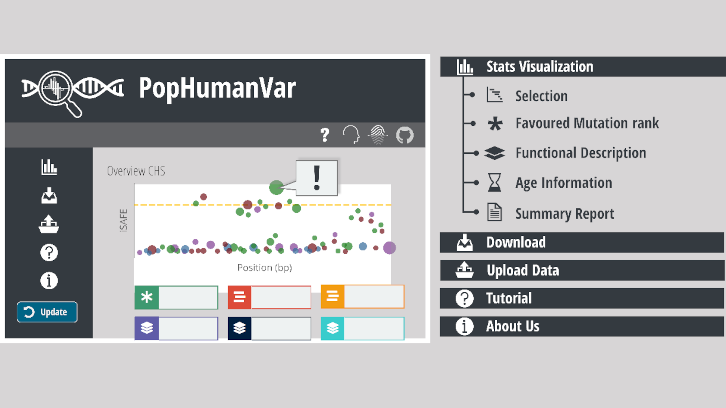PopHumanVar: a window into our past

Throughout our evolutionary history we have been subjected to persistent adaptive challenges that have left footprints on our genome. The UAB Bioinformatics of Genomic Diversity research group identified in 2019 multiple genomic regions that might be relevant to understanding human evolution. The study of their origin has given rise to the online resource PopHumanVar, in which functional and evolutionary genomics data for millions of genetic variants from different populations are collected, integrated and graphically represented. The application represents an advance in the study of human adaptation to different environments and cultural changes in the expansion around the planet.
Throughout our evolutionary history we have been subjected to persistent adaptative challenges: changes in environmental conditions as we left Africa and expanded to the rest of the planet; changes in diet as we replaced the hunting of wild animals and fruit picking with farm animals taming and cereal farming. Our adaptative responses to all these selective pressures have left their signatures in our genomes. Nowadays, we can identify and analyze them in order to reconstruct our past.
In 2019, the research group Bioinformatics of Genomics Diversity from Universitat Autònoma de Barcelona identified 2859 regions of our genome that could be relevant to the understanding of human evolution, 873 of which had not been described before. The group thus provided a very valuable set of data to answer the question "What makes us humans?" and made it freely accessible through the PopHumanScan database.
The catalog PopHumanScan was a first step in understanding which signatures selection has left in our genomes, but in order for them to help us reconstruct our past, we need to narrow them down and study their origins. What genetic mutation caused the signature? What are the functional consequences of this mutation? When did it occur? At which population? To give an answer to these questions, the research group has published a new online resource, PopHumanVar. It is an interactive database that facilitates the exploration and analysis of regions of our genome holding evidences of having been the target of natural selection at a given point of our evolutionary history.
PopHumanVar collects, integrates and graphically represents functional and evolutionary genomic data from millions of genetic variants based on 2504 complete genomic sequences of 26 human populations from different parts of the world. Thanks to all the gathered information, PopHumanVar allows us to look into specific genomic regions in order to find the mutation responsible of an adaptive event and to find out when and where it first emerged. For instance, PopHumanVar identifies mutations responsible for well-known adaptative processes such as the EDAR gene in the East Asian population, involved in the development of the hair follicles, teeth and sweat glands; the ACKR1 gene (DARC) in Africa, that plays a role in the inflammatory response and is associated with malaria resistance; and the one near the LCT gene in European populations, responsible for the digestion of lactose. Moreover, the application allows the user to add and analyze their own data so that they can study adaptive processes in populations not included in the application.
The application PopHumanVar is a breakthrough in the study of human adaptation to different environments and to big cultural changes during its expansion over the Earth. It is open access and freely available at https://pophumanvar.uab.cat. Learn to use it and delve into our species past following the tutorial that you will find in this link!
Aina Colomer and Sònia Casillas
aina.colomer@uab.cat
sonia.casillas@uab.cat
Department of Genetics and Microbiology
Universitat Autònoma de Barcelona
References
Aina Colomer-Vilaplana, Jesús Murga-Moreno, Aleix Canalda-Baltrons, Clara Inserte, Daniel Soto, Marta Coronado-Zamora, Antonio Barbadilla, Sònia Casillas, PopHumanVar: an interactive application for the functional characterization and prioritization of adaptive genomic variants in humans, Nucleic Acids Research, Volume 50, Issue D1, 7 January 2022, Pages D1069–D1076, https://doi.org/10.1093/nar/gkab925.

